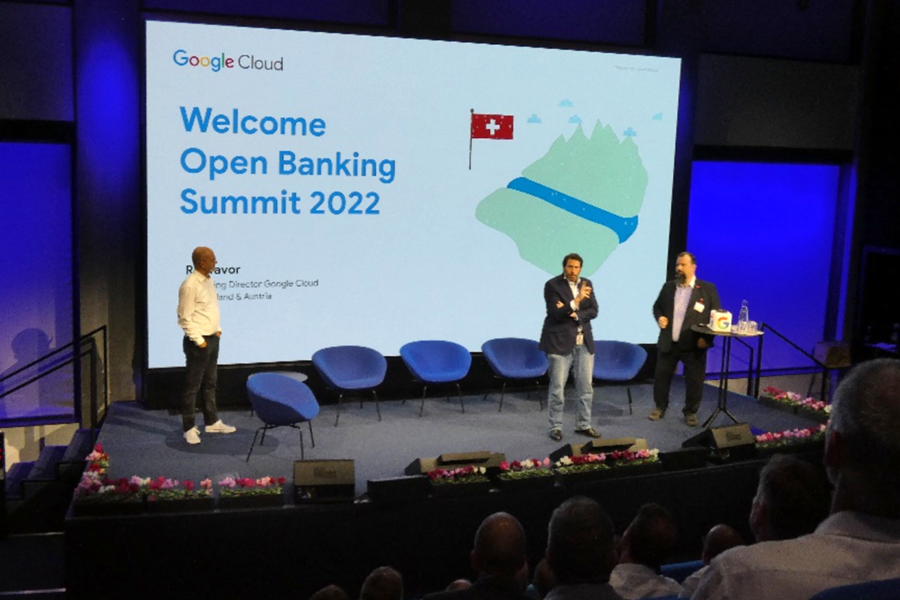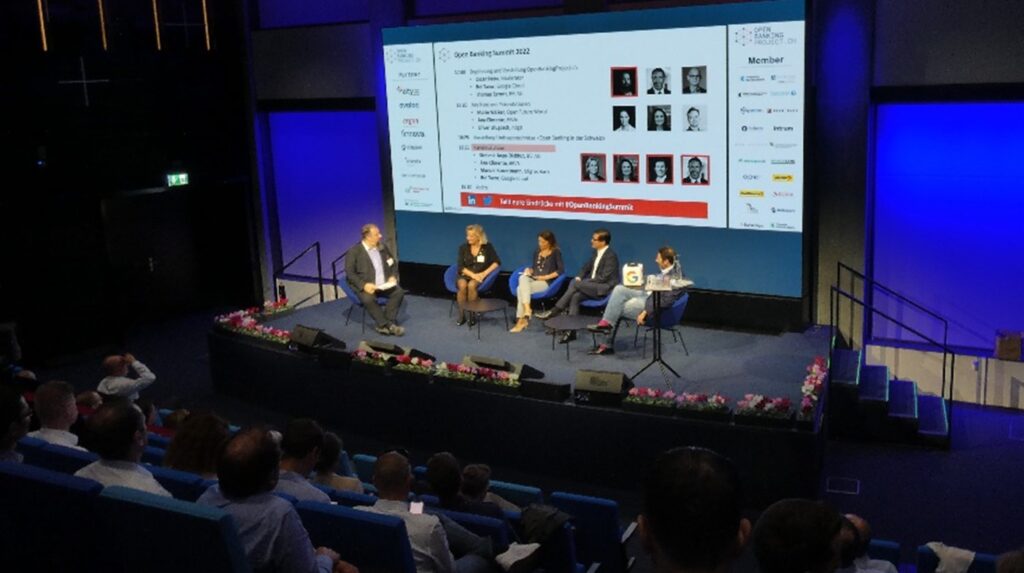
Insights from the Open Banking Summit 2022
“Financial Industry Meets BigTech”: On the 25th of August 2022, the third Open Banking Summit opened its doors in the Google event rooms in Zurich. The OpenBankingProject.ch organized this event for the third time and once again provided a stimulating get-together on the topic of open banking. The event featured national and international success stories, and the subsequent panel discussion reflected on and discussed selected topics and questions posed by the audience. Once again this year, around 120 decision-makers from the Swiss financial sector gathered to learn about current developments and to network over the subsequent aperitif.
But first things first… To welcome the guests, host Roi Tavor (Managing Director Google Cloud Austria & Switzerland) spoke introductory words about the relevance of open banking for the global technology group. The goal that the company is pursuing with its data-driven business model – putting the customer at the center of service delivery and creating the best possible customer experience – should also apply to the financial industry.
Thomas Zerndt (CEO, Business Engineering Institute St. Gallen) also tied in with this understanding in his presentation of the OpenBankingProject.ch. According to its definition, the open banking concept enables end customers to make their personal financial data accessible to various banks, financial service providers or FinTechs via open interfaces. It facilitates the creation of digital ecosystems in order to get closer to the customer and to open up new business models.
Marie Walker (Co-founder & Head of Content Open Future World) then gave us an insight into the worldwide developments in open banking, especially from the UK, Australia and the USA. In summary, a trend towards opening up the financial industry can be observed. However, the concept is developed differently in the various countries. The understanding is often extended beyond Open Banking. A shift towards Open Finance and Open Data is discernible. Not only a regulatory or technical approach should be pursued, but a customer-centric and cross-industry approach that appropriately involves all stakeholders. After an overview of the most interesting use cases, such as account aggregation, cash flow management and invoicing for SMEs, Marie presented us her summary. Open Banking is not a short-term phenomenon and is here to stay in the medium term. It opens up new opportunities and ultimately, as with any other innovation, is a learning process. Companies should therefore be clear about their positioning sooner rather than later.
The next speaker was Ana Climente (Head of Open Banking Spain, BBVA), who shared her experience from five years of Open Banking at BBVA. The starting point of the effort was the growing customer demands and new user needs. Real-time financial services from anywhere, interactions across multiple channels, and end-to-end digitalised customer experiences are just some of the challenges that banks need to respond to. This trend is reflected in the exponential growth of open banking services in Europe. On one hand, the development can be attributed to PSD2, but on the other hand, the services have functionalities that go far beyond payments. In this context, the development of digital ecosystems plays a central role. This involves looking at the entire living environment (e.g., housing, mobility, health) of a customer so that, together with partners, the customer experience can be designed to be as consistent and convenient as possible. But is there one strategy for successful open banking? “You should be a first mover, basically dare and be willing to learn” Ana tells us. You learn from the customer and build strong relationships with partners. Combined with an API-first mindset, not from a technical but from a strategic perspective, and a focus on collaboration, sustainable value can be created.
In the next presentation, Oliver Dlugosch (CEO and Co-Founder, ndgit) shared his experiences in working with the different players from the perspective of an API platform provider. He traces the strong and almost exponential growth of the last three years back to the relevance of APIs for service delivery. The desire to enable customers to let others access their data and the associated demand for services is what he sees as a key driver. More than half of the users are willing to share their data if the added value for the customer can be clearly communicated. Furthermore, two areas can be observed in which open banking promises revenue potential: Infrastructure or products in the form of a banking-as-a-service approach, such as Solaris Bank, and the development of digital banking ecosystems with individual customers at the center of the service design.
In the last presentation before the panel discussion, Thomas Zerndt presented selected results and conclusions from the survey “Open Banking in Switzerland”, which was published today. There is a basic agreement on what the purpose of open banking is. However, the survey participants rate a variety of different use cases as relevant, so we are likely to see different manifestations and areas of focus in the future. The survey is intended to show the relevance of open banking in Switzerland and can provide an initial orientation on current developments. With more than 180 responses from banks, technology providers, fintechs and consultancies, the representative results were then deepened in selected expert interviews. First, the understanding of the concept was examined. The focus is on simplifying collaborations between banks and third-party providers. Although open banking can also be understood as a regulatory-driven opening (e.g. PSD2) of the banks, the focus is on the end customers’ self-determined use of data and the associated innovation. All target groups, fintech, bank customers, providers and banks can benefit from each other. But which use case has the greatest potential? The high and overarching approval of every use case from the initiation of payments to open wealth to the conclusion of a mortgage implies that there will not be one use case.

With these results, we then moved on to the last item on the evening’s program, which provided very exciting impulses, suggestions and food for thought. Dr Stefanie Auge-Dickhut (Head Competence Center Ecosystems, Business Engineering Institute St. Gallen), Manuel Kunzelmann (CEO, Migros Bank), Roi Tavor and Ana Climente delved into the topic of the current status quo in a varied discussion moderated by Oscar Neira.
Stefanie Auge-Dickhut kicked off the discussion by once again emphasizing the relevance of the end customer: “Customers don’t want products, they want integrated services. You have to open up, banks have a lot of potential, you’ve only just started”. Ana Climente added that customers have fundamentally changed their behaviour and the evolution is inevitable for banks. Nevertheless, debates should take into account that open banking is only a means to an end. Manuel Kunzelmann explained that data protection is a driving element. But in the whole API discussion, one should not lose sight of profitability. Standardization is a means here to reduce process costs, for example. Roi Tavor emphasizes thinking from the customer’s perspective. Open banking is not relevant as long as you can’t show a customer their benefit and while the monetization is missing.
These and many other discussions were continued at the subsequent aperitif in the relaxed atmosphere of the location. “Save the date”: The next Open Banking Summit will be held on Thursday, Aug. 24, 2023, in the Zurich area. For more information, visit www.obp.ch.

